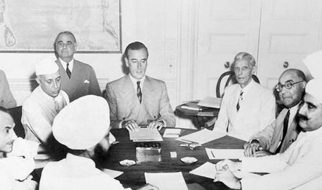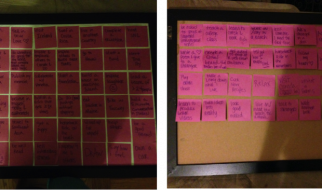Sometimes you need to start something to know it?s not right for you

I?m fortunate to be in the midst of a relatively successful career. And my college major has nothing to do with it.
In my junior year of undergrad, I switched from a communications major to history major.
I loved history, particularly American Revolution-era history. I loved locking myself in the library for hours and doing research ? real research with microfilm and dusty books on forgotten shelves, no Googling ? and I?d always prefer writing a paper over taking a test. Moreover, my school had a fantastic roster of professors in the department, so I decided to switch it up and change my career path. I taught SAT-prep courses for The Princeton Review part-time and I loved the atmosphere of a college campus, so why not combine the two and be a college history professor?
Perfect.
That was the extent of my planning.
While choosing a ?soft? undergrad major isn?t the death sentence it?s often made out to be, there still needs to be a plan for life after graduation. I had none. My problem wasn?t the major, it was my lack of focus, direction, and drive. While I watched classmates and friends get into grad school or turn internships into full-time positions, I chose instead to party and relax, smug in the knowledge that it would all somehow work out despite no evidence to support it.
It did not.
I spent the summer after graduation in Portland, Oregon, moping around, missing college, wishing things were different. I wasted my time and was generally directionless. However, I did make one smart decision. A master?s degree is a requirement to teach at the college level so I?d need to take the GRE. Fortunately, I had packed several GRE prep books and towards the end of the summer I started tossing them into my bag and walking a few blocks to Peet?s Coffee. I spent several hours every day in that coffee shop, studying words, drilling problems, practicing my essays. My post-graduation malaise was finally beginning to lift as a plan for my future was slowly beginning to emerge.
I came back east and began working manual labor and odd jobs while I kept studying at night while also schmoozing for reference letters. By October, I had finagled a job in finance in the non-profit sector and my parents slowly began to believe that I wouldn?t die penniless on their couch. I took the GRE one Saturday morning and, unlike the SAT, which had a been a disappointing performance (aside from the date I had managed to procure during one of the breaks), I did very well. I may not have crushed it, but I came very close to doing so. Let?s say I severely dented it.
With my GRE scores in one hand and my glowing reference letters in the other, I started applying to part-time graduate history programs, which require 30 credits (ten classes). Unlike undergrad, I didn?t do the dream/match/safety school thing. Instead, I applied to only a few schools with hopes of getting into one in particular.
After some time, the responses came back. I was accepted to all.
I got into Villanova? Holy shit! A school that wouldn?t have sniffed me coming out of high school just accepted me into their graduate program?
I vowed that I would take my graduate studies far more serious than I had ever taken anything in my life.

As summer began to wind down, information on the fall semester arrived. I was focused and determined. Then, one day, the syllabus came. I can?t find it (my OCD with organization backfires when I need to reference something years later) but I found this one from a 2009 course at Cleveland State University that is very similar and will suffice:
Assignments: Each week students will hand in a 500-word synopsis of the reading for that week. In this, students should outline and compare the authors? arguments. Students will read authors who disagree so please be careful to outline their disagreements as well as their points of agreement. Each assignment will be worth 10 points.
FINAL ASSIGNMENT: Write a fifteen page, double-spaced paper that addresses this question: How radical was the American Revolution? We will discuss this assignment throughout the semester. The final is worth 100 points, and failure to hand in a final paper will result in failure for the course.
Attendance: I expect graduate students to attend class, to be prepared, and to contribute to class discussion.
As far as the required reading, you?d never find these in most bookstores. You won?t find David McCullough or Joseph Ellis or Jeff Shaara or even John Ferling. Those writers are too popular, their work too accessible, for graduate school where the curriculum is full of heavy tomes of at least five hundred pages filled with small, packed print. This is academia where the fewer books you sell, the better (come to think of it, I?d fit right in).
Here are the books from that same Cleveland State syllabus:
Anderson, The War That Made America: A Short History of the French and Indian War.
Aron, How the West Was Lost.
Cogliano, Revolutionary America.
Egerton, Death or Liberty: African Americans and Revolutionary America.
Holton, Unruly Americans and the Origins of the Constitution.
Kerber, Women of the Republic: Intellect and Ideology in Revolutionary America.
Matthews, The Radical Politics of Thomas Jefferson.
Nash, The Unknown American Revolution.
Purcell, Sealed with Blood: War, Sacrifice, and Memory in Revolutionary America.
O?Shaughnessy, Empire Divided.
Taylor, The Divided Ground.
Turabian, et al., A Manual for Writers of Research Papers, Theses, and Dissertations.
Young, Liberty Tree: Ordinary People and the American Revolution.
Forget reading them. How many of those books or authors have you even heard of? After obtaining a bachelor?s degree from a well-respected private university, I thought of myself as well-read and prepared for the material. I knew it?d be hard, but I didn?t realize just how tedious it would be.
I went to the bookstore and bought the three books we were expected to have read by the first class. Jesus Christ, were they were dense. Dry, pedantic, and footnoted to death, I found them virtually impenetrable. I couldn?t do it. No amount of dedication could get me beyond the first few chapters. And I?m a person that fetishizes books!
I decided that it didn?t matter if I read everything. It was only the first class and, besides, I?d been able to bullshit my way through sixteen years of education. What was one more?
I left the office that day eager and excited, like every other first day of school in my life. Although I was no longer an undergraduate and didn?t know my way around, it was nice to be back on a beautiful campus, with all that it entails. After eating a few slices of pizza in the food court, I made my way to class.
Actually, it wasn?t a class, but a seminar. Seminars are not like regular classes. Rather than a traditional setup of every student facing forward and staring at a person in the front of the room, a seminar is seen as a more mature approach to learning, and thus generally don?t begin until the final year or so of college. Students are expected to have done the assignments and be ready to have a lively and in-depth discussion about the material.
Aside from the absence of windows, our seminar room wasn?t different from any office conference room ? a long table in the middle of the room with chairs all around and some shelving on the walls. We trickled in and sat down, with almost no small talk since we were all strangers.
Finally, the professor walked in. She was an older woman, squat in stature with a face that smiled easy and frizzy hair that was mostly gray. She had a disheveled look, with two stuffed bags hanging off her shoulders and a rolling suitcase that she pulled behind her. She had the look of a librarian in a children?s fantasy film that knows where every book is located and, if you ask the right question, will lead you to the secret portal in the basement.
She sat down and my graduate school experience began.
She referenced the material and began to ask questions meant to generate conversation. Immediately, as so often happens, three or four individuals became the major contributors, but our professor was determined to get everyone involved, so while she wouldn?t call on people per se, she would direct her words to various people around the table. I contributed little, and the things I did say were not outright rejected, but were seen as superficial and not really all that beneficial to the discussion at hand.
At the end of the table, opposite the professor, was a young woman that was the antithesis of me. It was obvious that she had not only read the material, but had devoured it, and was starving for more. Her points were lucid and cogent, but at the same time, they dug into the heart of the readings, tying together seemingly disparate themes and combining them into a larger commentary. Not surprisingly, the professor loved her. I instantly realized that I was several levels below her.
Sometimes she tried a bit too hard. That?s common among graduate students, particularly the younger ones. They?re so eager to show off how erudite they are that they come off as pretentious. Whenever someone would make a point using polysyllabic words or mention books they were reading, I?d immediately hear Will Hunting in my head:
?Of course that?s your contention, you?re a first-year grad student. You just got finished reading some Marxian historian, Pete Garrison probably. You?re gonna be convinced of that ?til next month when you get to James Lemon. Then you?re going to be talking about how the economies of Virginia and Pennsylvania were entrepreneurial and capitalist way back in 1740. That?s gonna last until next year; you?re gonna be in here regurgitating Gordon Wood, talkin? about, you know, the pre-revolutionary utopia and the capital-forming effects of military mobilization.?
I could tell I wasn?t the dumbest kid in the class, but I was far from the smartest. That?s the point, after all ? if you?re always the smartest person in the room, find another room ? but I was certainly one of the least prepared.
The fact that I couldn?t get through the material was a problem, but it was secondary to the fact that I just didn?t want to. I didn?t care. I wasn?t invested.
After that first class, things improved. Over the next few weeks, I began to feel my way through both the class and the materials and did not feel as lost as I had that first night. Still, I wasn?t enjoying myself. I was no longer eager or excited. I wasn?t even intellectually stimulated.
I can vividly remember sitting there in my fifth week of class, counting down the minutes until I could escape, thinking about what was happening at work, when I was struck with an epiphany: I liked my job far more than school. While I didn?t love going to work, I didn?t dread it the way I dreaded going to class. For the first time in my life, I hated school.
Like G.O.B. Bluth, I?d felt like I had made a huge mistake.
It was as clear an emotion as I?ve ever had and suddenly, everything clicked. Normally, you use a day job to pay for night class so that you can get a degree that will eventually get you a better day job. But that?s not what I was doing. I had a job I liked, so why was I going to school and hating it? Just because I had thought it was what I wanted? Because it?s what I was supposed to do? Because I had spent all that time studying for the GRE and applying to schools? So what? Those were sunk costs regardless of what I did going forward.
Although I had this sudden clarity, I didn?t want to make a rash decision. After all, I had asked for letters of recommendation from professors and mentors I admired and had been elated to be accepted to such a fine school. It had been less than two months earlier that I was excited to start this class, so I wanted to be sure before I bounced.
Most people will tell you not to quit graduate school and that?s generally good advice, particularly because:
?completing only part of a graduate degree does not count toward your career advancement. The main value in a graduate degree is usually the credential, the authentication that it affords you to practice in a particular field. You might be getting lots of other great mind-expanding things from your graduate degree, but you will only maximize the value of the degree if you finish it?Graduate degrees are also notoriously expensive. And you won?t be able to see the benefit that will allow you to balance out that cost unless you finish it?Once you start, in order to get career value out of what you have begun, you need to finish.?
That?s all true. So is the fact that we learn from mistakes and failure is often a necessary speed bump on the road to success, particularly when we?re surrounded by peers and colleagues that force us to raise the level of our performance.
But you also need to know yourself and when you?re in a situation that isn?t conducive to your growth. Existence is filled with hardships, so quitting something because it?s difficult or uncomfortable is not a sustainable way to go through life, but sticking with something just because you started it, regardless of additional information or experience, is not only stubborn, it?s insane. Whether it?s school, work, relationships, books, home improvement projects, parenting approaches, whatever ? continuing to do something the same way because you started it is a recipe for failure and misery. If it isn?t adding any value, you need to be able to know when to cut your losses.
Besides, it?s not like I was almost done and had invested copious amounts of time and energy. I wasn?t halfway through. I wasn?t even a tenth of the way through. I was six weeks into a program that would?ve taken me at least two years to complete. And I was already feeling like my career was leading me in a different direction, one I could not have imagined a year earlier.
My brother tells a story about having a conversation with a classmate on the morning of their law school graduation. His friend said to him, ?Man, I really don?t want to be a lawyer, but it?s too late.? He had invested three years and tens of thousands of dollars into studying law. He was too far gone. He was at the end of the bridge, one step away from making it to the other side, when he realized he hadn?t ever wanted to cross it in the first place.
With this in mind, I called my brother to discuss this sudden realization and all of its consequences. I explained it all to him and asked him what he thought. He said, ?It?s great that you realized it so soon after starting. It?s early enough in the process that you can leave and it won?t really affect you too much.? I worried my parents would once again think of this as just another pothole on my path to mediocrity, but they were supportive. As long as I had a full-time gig, they felt like they could relax at least a little bit.
I didn?t withdraw just yet. I wanted to go to class one more time to see if my feeling had been real. Too often, we have a great idea or realization that seems perfect but quickly fades. But this one stuck. As soon as I entered that room, I knew it?d be the last time. I had already moved on. With visions of never returning dancing in my head, I could barely concentrate and counted down the minutes until class ended.
I walked out of the room, through campus, and to the train station, confident in my decision but a bit regretful that it hadn?t worked out. I thought one day I might return, but I seriously doubted it.
By my second year out of undergrad, I was making more than I would have as a professor and that was before colleges began cutting full-time faculty and relying much more on adjuncts, a trend that is bad for everyone. I would point to stories about professors hovering around the poverty line and even unionizing in hopes that they won?t die broke as reasoning for leaving ?Nova, but that was all revisionist history. The truth was, it wasn?t for me, no matter how much I tried to convince myself that it was.
Sometimes we don?t know ourselves as well as we think we do.

Eventually, I did go back. Only, not to Villanova and not for history.
After nearly four years in that non-profit finance role, I was itching for a change and my progress was being stymied by working in a flat organization and my lack of business education. I couldn?t do anything about the first thing, but I could do something about the second.
The longer you?re out of school, the more difficult it is to get your mind back into it and I didn?t want to waste any more time. I went back to the basics, securing GMAT books and studying to transform my life through a postgraduate degree. Again.
This time I applied to only one school. The Fox School of Business and Management at Temple University?s part-time MBA program is 54 credits (18 classes), nearly double that of a master of arts and, moreover, it?s a well-regarded school (well, usually) where admission is not guaranteed. My GMAT scores weren?t as strong as my GRE and I had taken the same amount of undergrad business courses as someone that never attended college, so I was far from a lock. I filled out the application, crossed my fingers, and submitted it.
It wasn?t long before I received a response. I wasn?t accepted, but I wasn?t rejected either. I was instead invited to a meeting with a couple of individuals in the admissions office. When I sat down, they informed me that while I met their three criteria for admission ? undergraduate grades, GMAT scores, and professional resume ? they were bothered by my lack of business classes and, as a result, were hesitant to accept me into the program. They explained that in the past they had accepted students similar to me who thought they wanted an MBA only to drop out a few weeks later. That certainly sounded familiar. We had a constructive discussion and, at the end, they basically asked if I would give my word that if they accepted me, I would stick with it and complete my degree.
I promised that I would and soon thereafter, I received my acceptance letter. Four years later, after some truly trying times and plenty of moments of self-doubt, I received my degree.
One evening towards the end of program, as I walked from my office to class, I passed a woman on the street that was vaguely familiar to me. I knew I had seen her before, but I couldn?t place. Then it hit me. She had been the professor of my lone class at Villanova. I knew that she, like me, worked a full-time job downtown during the day and I could see that she was rushing to get to her class. It was like something out of a bad movie ? we cross paths on our way to different destinations and I am once again reminded of the different and unexpected path that my life had taken.
On a recent visit to my parents? home, my mother asked me about Villanova?s chances in the NCAA tournament. I told her that I expected them to return to the Final Four again in 2017 and she was pleased to hear this (she roots for all Philly-area teams).
?That?s my school,? I said jokingly.
?What do you mean?? she asked.
?Remember when I went there??
?For what??
?As a student.?
?What? I don?t remember that.?
?Yeah, I was a Villanova student for six weeks. I went for graduate school history.?
?Oh, yeah,? she said. ?I forgot about that. I just remember you really hated it.?
That?s pretty much all I remember too.
Christopher Pierznik is the author of nine books, all of which are available in paperback and Kindle. In addition to his own site, his work has appeared on XXL, Cuepoint, Business Insider, The Cauldron, Hip Hop Golden Age, and many more. Follow him on Facebook or Twitter.
![Dropping Out of Grad School [The First Time] Is the Best Decision I’ve Ever Made](https://911weknow.com/wp-content/uploads/2020/09/dropping-out-of-grad-school-the-first-time-is-the-best-decision-ive-ever-made-1-501x275.jpeg)

